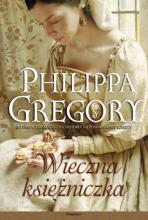
The Constant Princess
Wieczna księżniczka
VIII.2011 (paperback)
XI.2011 (paperback)
IV.2013 (paperback)
Born in Kenya in 1954, Philippa Gregory moved to England with her family and was educated in Bristol and at the National Council for the Training of Journalists course in Cardiff. She worked as a senior reporter on the Portsmouth News, and as a journalist and producer for BBC radio. Philippa obtained a BA degree in history at the University of Sussex in Brighton and a PhD at Edinburgh University in 18th-century literature. Her first novel, Wideacre, was written as she completed her PhD and became an instant world wide bestseller. On its publication, she became a full-time writer, and now lives with her family on a small farm in the North of England. Her knowledge of gothic 18th century novels led to Philippa writing Wideacre, which was followed by a haunting sequel, The Favoured Child, and the delightful happy ending of the trilogy: Meridon. This novel was listed in Feminist Book Fortnight and for the Romantic Novel of the Year at the same time - one of the many instances of Philippa's work appealing to very different readers. The trilogy was followed by The Wise Woman, a dazzling, disturbing novel of dark powers and desires set against the rich tapestry of the Reformation, and by Fallen Skies, an evocative realistic story set after the First World War. Her novel A Respectable Trade took her back to the 18th century where her knowledge of the slave trade and her home town of Bristol produced a haunting novel of slave trading and its terrible human cost. This is the only modern novel to explore the tragedies of slavery in England itself, and features a group of kidnapped African people trying to find their freedom in the elegant houses of 18th century Clifton. Gregory adapted her book for a highly acclaimed BBC television production which won the prize for drama from the Commission for Racial Equality and was shortlisted for a BAFTA for the screenplay. Next came two of Gregory's best-loved novels, Earthly Joys and Virgin Earth, based on the true-life story of father and son John Tradescant working in the upheaval of the English Civil War. In these works Gregory pioneered the genre which has become her own: fictional biography, the true story of a real person brought to life with painstaking research and passionate verve. The flowering of this new style was undoubtedly The Other Boleyn Girl, a runaway best-seller which stormed the US market and then went worldwide telling the story of the little-known sister to Anne Boleyn. Now published in 26 countries with more than a million copies in print in the US alone, this is becoming a classic historical novel, winning the Parker Pen Novel of the Year award 2002, and the Romantic Times fictional biography award. The Other Boleyn Girl was adapted for the BBC as a single television drama and a film starring Scarlett Johansson as Mary Boleyn, Natalie Portman as Anne Boleyn and Eric Bana as Henry VIII. Six Tudor novels later, she is looking at the family that preceded the Tudors: the magnificent Plantagenets, a family of complex rivalries, loves, and hatreds.
She lives in Yorkshire in the North of England with her husband and two children and in addition to interests that include riding, walking, skiing and gardening (an interest born from research into the Tradescant family for her novel, Virgin Earth), she also runs a small charity building wells in school gardens in The Gambia. More than fifty wells have been built by UK donors to date.
Philippa Gregory presents the remarkable story of Katherine of Aragon, Princess of Spain, daughter of two great monarchs, and eventual Queen of England when she marries the infamous King Henry VIII. Daughter of Queen Isabella and King Ferdinand of Spain, Katherine has been fated her whole life to marry Prince Arthur of England. When they meet and are married, the match becomes as passionate as it is politically expedient. The young lovers revel in each other’s company and plan the England they will make together. But tragically, aged only fifteen, Arthur falls ill and extracts from his sixteen-year-old bride a deathbed promise to marry his brother, Henry; become Queen; and fulfill their dreams and her destiny. Widowed and alone in the avaricious world of the Tudor court, Katherine has to sidestep her father-in-law’s desire for her and convince him, and an incredulous Europe, that her marriage to Arthur was never consummated, that there is no obstacle to marriage with Henry. For seven years, she endures the treachery of spies, the humiliation of poverty, and intense loneliness and despair while she waits for the inevitable moment when she will step into the role she has prepared for all her life. Then, like her warrior mother, Katherine must take to the battlefield and save England when its old enemies the Scots come over the border and there is no one to stand against them but the new Queen.